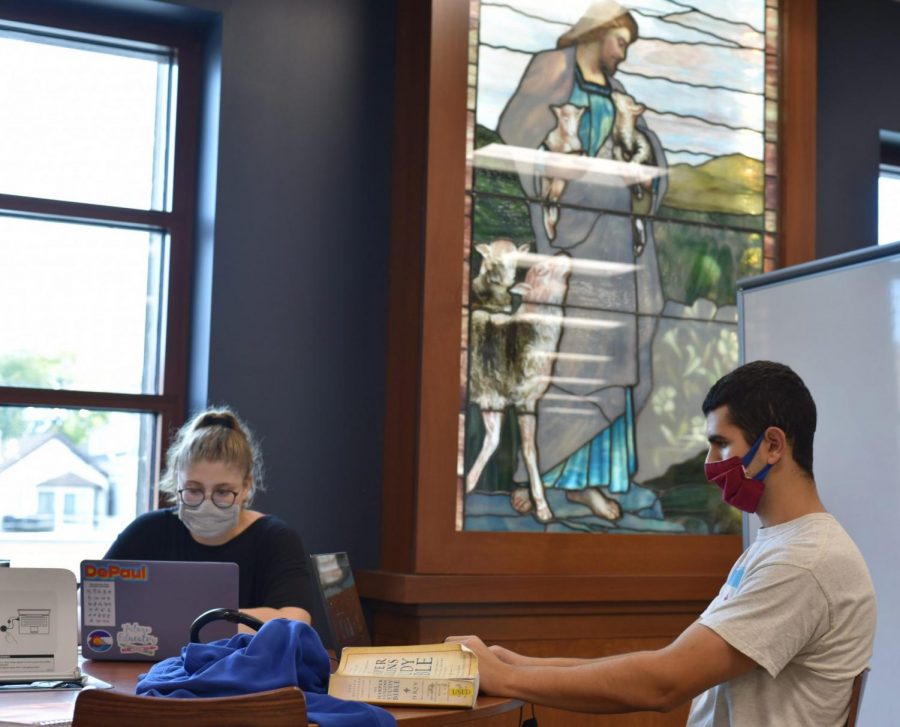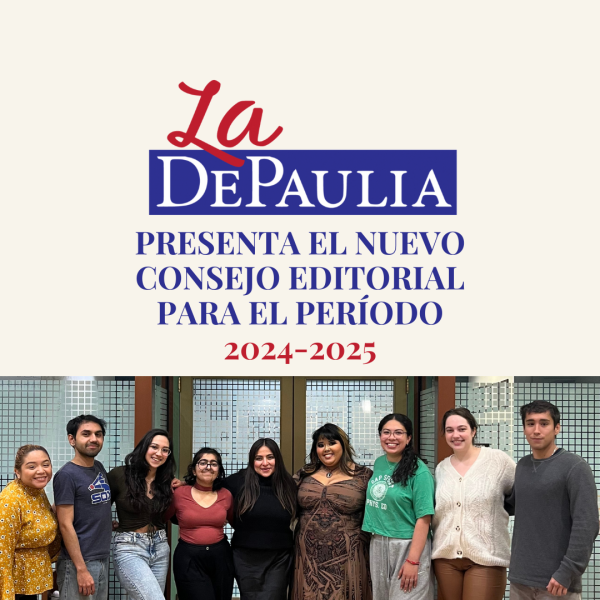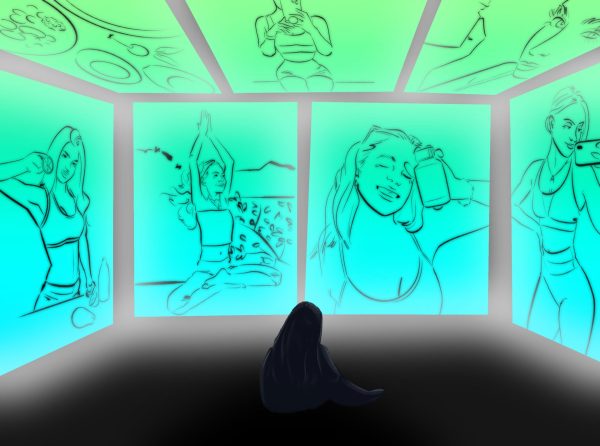Give us more: DePaul requires religion yet lacks interfaith classes, multiple religions not represented in classes
Students study at DePaul’s John T. Richardson Library in Lincoln Park, a building filled with religious imagery.
Searching for a course on religion is not hard: There are 158 classes that count towards the general requirement for religious classes at DePaul. But, out of these 158 options for required classes, there are only three classes geared towards Hinduism, seven for Buddhism, seven for general Christianity and none for interfaith.
Some may argue there are classes for interfaith like Debates about God or Religion and Culture in America, but none of the options shown in class registration to discuss how to respect people practicing their religion or to discuss religion respectfully. For all these students know, it will be more of a lecture about the different types of religion than an experience of discussion where students can learn about different religions through their peers.
Freshman Ethan Siebel thinks religion classes should not be a requirement. He said if the religion class requirement remains, he would like some different classes to be offered.
“I like the concept of offering a class on religious tolerance [or] interfaith as an alternative to the current religion course credit requirement,” Siebel said. “I also think a class on spirituality and its mental health benefits could be a good alternative course to fill the religion credit requirement.”
Sophomore Liz Bazzoli said a class on tolerance would be a subjective type of class, not providing much benefit other than surface level.
“I think there should obviously be [an] all-inclusive education covering multiple religions, but I also think ‘tolerance’ is an easily problematic trap to fall into,” Bazzoli said. “Religion is a deeply personal and individualistic practice, and I think it’s easy to generalize what Hinduism is or Judaism is, for example. By just teaching religious texts or basic beliefs you run the risk of erasing the nuance of religious belief and practice and almost dehumanize it in a way, so I think it’s a fine line to walk. Just being ‘tolerant’ doesn’t really give due respect to religion.”
Freshman Nickolas Kreuger agrees with the concept of having a class that goes more in depth into different religions. He said, “I think that [it] would be cool to have an interfaith class but I think it would be better used as a module like the alcohol modules [used in explore and discover classes].”
Religious classes should not be a requirement at DePaul, despite the school’s identity as a Catholic university. Students at DePaul who are of a different religion should have an equal amount of classes available to them so they can have an opportunity to get into a class they best align with rather than being forced to go into a class based on Catholicism as a backup. There should at least be an interfaith class as an option for students who are enrolling in their classes later than most.
“I really don’t think [religion classes] should be [required],” Krueger said. “I can understand why [there is a requirement], but when you’re at this age, you’ve already been raised a certain way or have your own values. If you’ve wanted to find a new religion or such you’ve done the research already. There’s only so many enlightenment stories of people being required to take a class and then falling in love with it.”
Additionally, according to the Association of Catholic Colleges and Universities, to be classified as a Catholic university or college, the school has to be faithful to tradition, has to have Christian values, vision and goals, must be committed to service and must reflect Christian faith. Nowhere in the requirements is there a necessity for students to attend nor pass a religion class, so DePaul would not be negatively affected as an institution by pulling this requirement from the school.
If anything, DePaul would benefit from this change in curriculum. Those who don’t practice religion would feel more comfortable at DePaul instead of feeling forced to engage with religion through a required course. Students who have a specific religious belief should have more classes offered to them that pertain to their religious affiliation.
Those who are interested in religious studies should have more unique classes available if they wish to explore different religions, academically or spiritually. Those who follow a religion besides Christianity may feel more represented at DePaul if these classes are implemented. But if there is not a more inclusive spectrum of courses pertaining to different religions, DePaul should not require students to take religion classes.













Allan Ding • Oct 22, 2021 at 4:42 pm
Here is something I don’t understand: the author does not want to take even one current REL course that teaches about different religions, and at the same time it is claimed that the rejection is based on the respect for religious diversity. Is it possible for someone to respect other religions while not knowing anything specific about other religions? Is “no intention to know anything about it” a form of tolerance or a form of intolerance? At least in my opinion, taking an intro-level course on religion is the only starting point for any meaningful discussion about religious diversity.
Fr. Dennis Holtschneider. CM • Oct 19, 2021 at 10:32 am
Hi Kiersten, You’re absolutely correct that the Catholic Church does not prescribe the exact courses or topics for the courses when it comes to religion in the curriculum. There are, however, three official documents whereby the Catholic church and the Vincentians make clear that they expect their universities to teach religion within the curriculum. (1) Ex corde Ecclesiae; (2) The Application of Ex corde Ecclesiae for the United States; and (3) “Vincentian Sponsorship of Universities.” Hope that’s helpful. Fr. Dennis Holtschneider, President, Association of Catholic Colleges and Universities (and proud past prez of DePaul!)